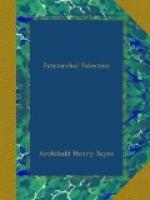The writer is anxious to display his knowledge of Syrian geography. Though he had not himself ventured to brave the discomforts of foreign travel, he wished to show that he knew as much about Canaan as those who had actually been there. A tour there was after all not much to boast of; it had become so common that the geography of Canaan was as well known as that of Egypt itself, and the stay-at-home scribe had consequently no difficulty in compiling a guide-book to it.
The following is the translation given by Dr. Brugsch of the papyrus, with such alterations as have been necessitated by further study and research. “I will portray for thee the likeness of a Mohar, I will let thee know what he does. Hast thou not gone to the land of the Hittites, and hast thou not seen the land of Aupa? Dost thou not know what Khaduma is like; the land of Igad’i also how it is formed? The Zar (or Plain) of king Sesetsu (Sesostris)—on which side of it lies the town of Aleppo, and how is its ford? Hast thou not taken thy road to Kadesh (on the Orontes) and Tubikhi? Hast thou not gone to the Shasu (Beduin) with numerous mercenaries, and hast thou not trodden the way to the Maghar[at] (the caves of the Magoras near Beyrout) where the heaven is dark in the daytime? The place is planted with maple-trees, oaks, and acacias, which reach up to heaven, full of beasts, bears (?), and lions, and surrounded by Shasu in all directions. Hast thou not ascended the mountain of Shaua, and hast thou not trodden it? There thy hands hold fast to the [rein] of thy chariot; a jerk has shaken thy horses in drawing it. I pray thee, let us go to the city of Beeroth (Beyrout). Hast thou not hastened to its ascent after passing over the ford in front of it?
“Do thou explain this relish for [the life of] a Mohar! Thy chariot lies there [before] thee; thy [feet] have fallen lame; thou treadest the backward path at eventide. All thy limbs are ground small. Thy [bones] are broken to pieces, and thou dost fall asleep. Thou awakest: it is the time of gloomy night, and thou art alone. Has not a thief come to rob thee? Some grooms have entered the stable; the horse kicks out; the thief has made off in the night, thy clothes are stolen. Thy groom wakes up in the night; he sees what has happened to him; he takes what is left, he goes off to bad company, he joins the Beduin. He transforms himself into an Asiatic. The police (?) come, they [feel about] for the robber; he is discovered, and is immovable from terror. Thou wakest, thou findest no trace of them, for they have carried off thy property.
“Become [again] a Mohar who is fully accoutred. Let thy ear be filled with that which I relate to thee besides.




